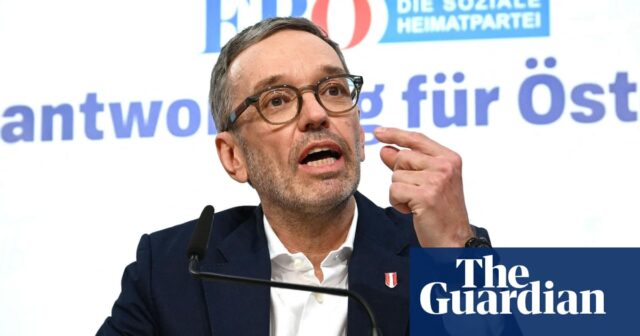The leader of Austria’s anti-immigration, pro-Kremlin Freedom party has said he intends to invite the mainstream centre-right party for coalition talks, potentially paving the way for the far right to rule the country for the first time since the second world war.
Herbert Kickl, whose party won the most votes in September’s election, was tasked with building a ruling coalition by the Austrian president on Monday following the collapse of talks between mainstream parties aimed at forming an alliance that would have blocked the Freedom party (FPÖ).
The negotiations between the conservative People’s party (ÖVP) and the centre-left Social Democrats went on for months but failed over differences on how to inject new life into Austria’s ailing economy and how to manage public finances.
As a result, Karl Nehammer, the chancellor, who had vowed never to become junior partner to the FPÖ with Kickl as head of government, announced his intention to resign.
In a 25-minute statement to the press on Tuesday, Kickl said he had accepted the challenge to “rebuild” Austria, heralding a “new era of politics” which would be built on “hard work, honesty and courage”. He said he was giving his “outstretched hand” to the interim ÖVP leader, Christian Stocker, but made clear that the other party had to understand it would be the junior partner in any coalition. Previous ÖVP-FPÖ coalition governments have had the far-right party as the junior element.
Kickl, a former interior minister, added that the talks would have to be based on, among other things, the ÖVP recognising its role in past mistakes. In a clear signal he would expect his party to secure key ministerial roles, including the chancellery, he said the ÖVP would have to accept that the FPÖ had come first in the general election, winning 29.2% of the vote and beating the mainstream centre-right party into second with 26.5%.
A failure by the ÖVP to accept this would lead to snap elections, Kickl warned. Stocker has already confirmed that he would speak to the FPÖ if they approached him.
Political analysts expect the FPÖ to press for key roles such as the interior and defence ministries. Kickl has provocatively described himself in the past as a potential Volkskanzler or “people’s chancellor”, a sobriquet sometimes used to describe Adolf Hitler. He deliberately sprinkled his election campaign rallies with Nazi-era slogans.
But despite the ÖVP moving closer towards the FPÖ on the major issue of immigration, and the parties’ policies overlapping surprisingly neatly on economic policy, any coalition between the two parties would be tricky to manage. They still have major differences on issues from Ukraine (the FPÖ is against support for Kyiv) to European defence.
after newsletter promotion
Kickl gave his highly anticipated statement on Tuesday against the background of the party’s slogan “the social homeland party” and behind a placard reading: “Responsibility for Austria”. Journalists were not allowed to ask questions. Some leading accredited media who have been openly critical of the FPÖ reported being excluded from the event owing to what the party described as “space constraints”.
The political drama unfolding in Austria is being closely observed across Europe, in particular in Germany, which will hold parliamentary elections in February and where the mainstream parties have pledged to retain a “firewall” around the far-right AfD party to prevent it from entering government.






